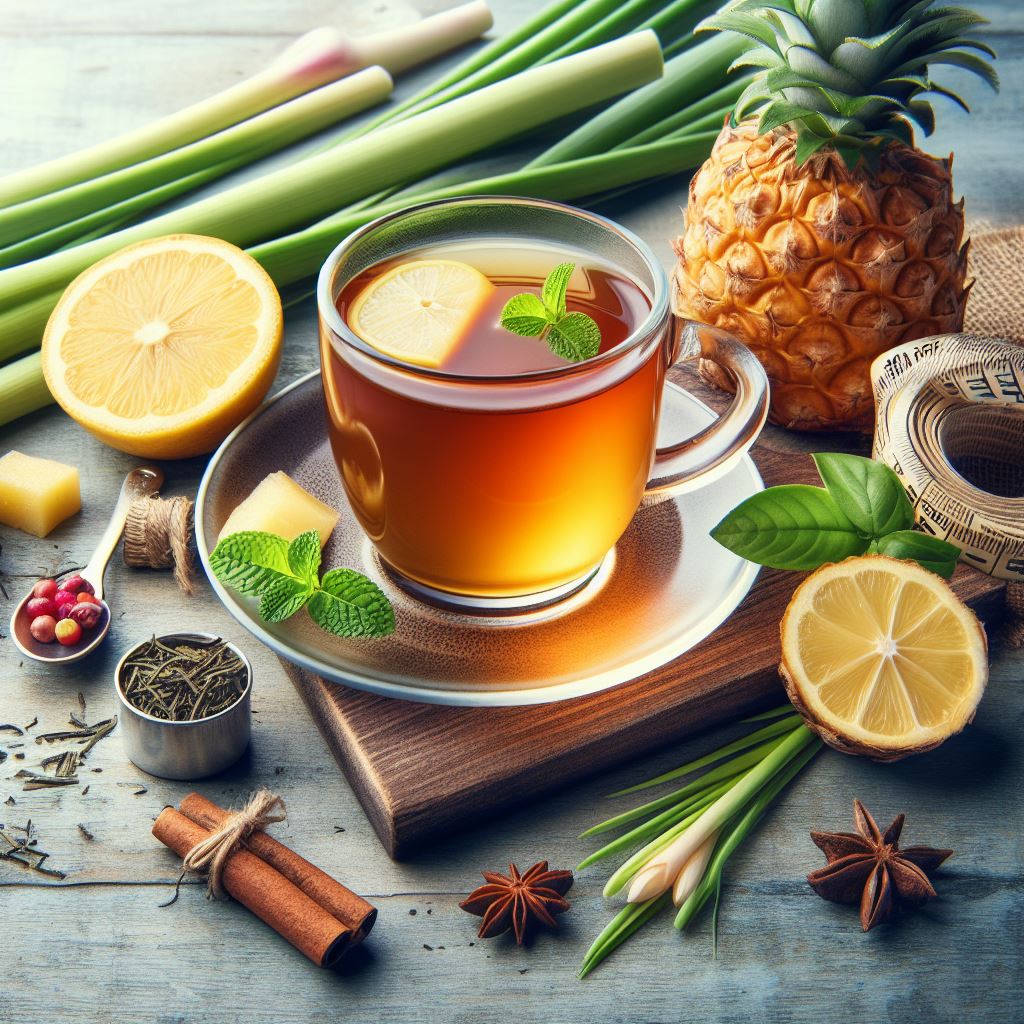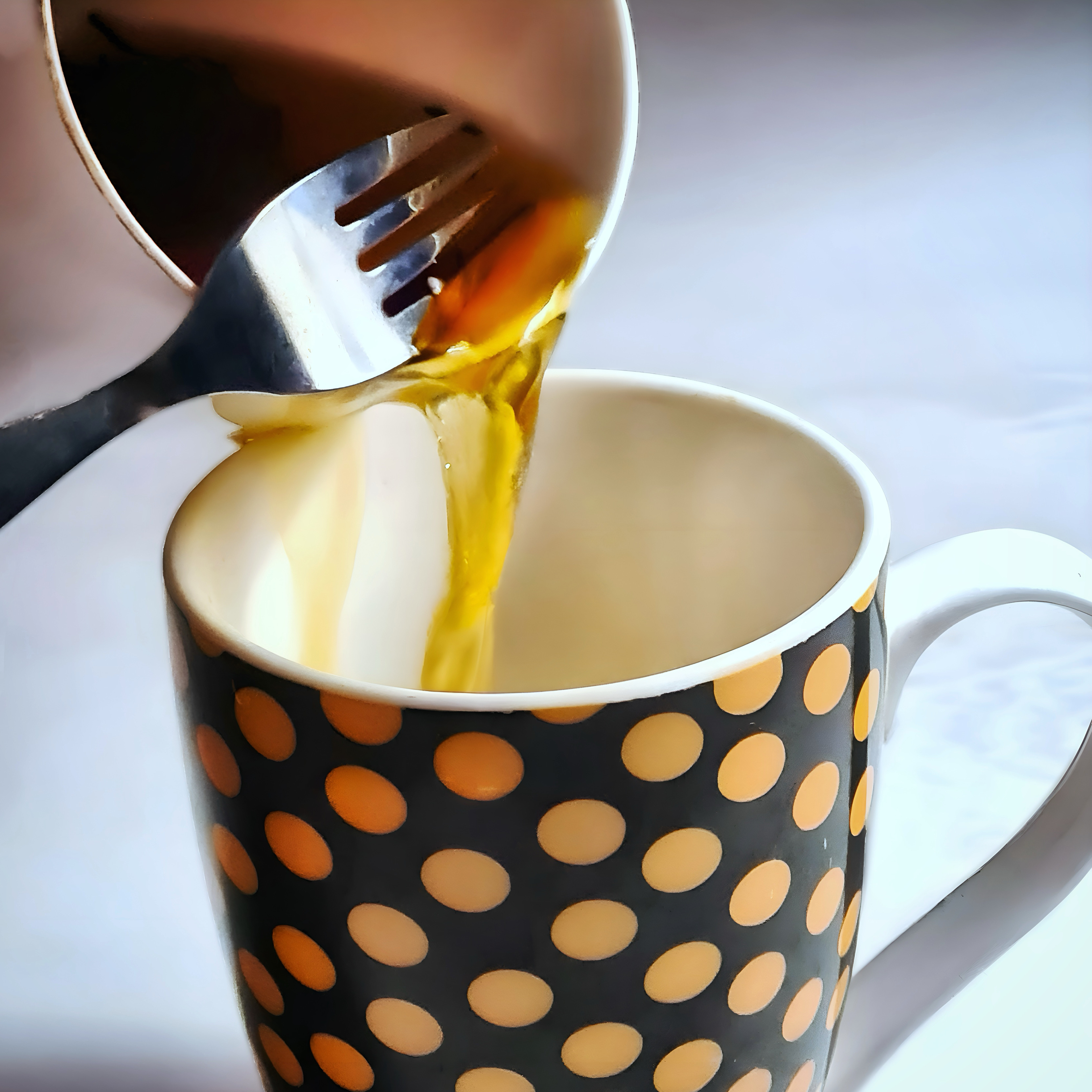Do you feel queasy or dizzy when you travel by car, plane, boat, or train? I know I do, especially when I look at my phone or a book! If you’re the same, you’re not alone. Motion sickness is a very common problem, affecting many people, especially children and pregnant women. But guess what? Tea can be used as a natural remedy for motion sickness.
Thats right! It can calm your stomach, relax your nerves, and balance your inner ear, all things that can aid motion sickness. So read on, and I’ll explore the science behind tea and motion sickness and recommend the best teas to try.

Understanding Motion Sickness
Before we get into the best teas to try, it’s important to understand the complex phenomenon of motion sickness. Once you understand the reasons for it, you can begin on your journey to combat it, with the help of tea!
The Phenomenon of Motion Sickness:
The phenomenon of motion sickness involves your sensory system, your nervous system, and your digestive system. As you travel, your eyes, ears, and body sense different aspects of your movement and position. For example, your eyes see the scenery passing by, your ears detect changes in air pressure and sound, and your body feels the acceleration and deceleration of the vehicle. These signals are sent to your brain, which interprets them and creates a sense of motion.
However, sometimes these signals do not match up. For example, if you are reading a book in a car, your eyes see a stationary object, but your ears and body feel the motion of the car. This mismatch confuses your brain and makes it think that something is wrong. Your brain then triggers a series of reactions to protect you from a possible threat, such as poisoning or infection. These reactions include increasing your saliva production, slowing down your digestion, and stimulating your vomiting reflex. If you are sufferer of motion sickness like me, you’ll know these symptoms all too well.
Factors that increase the risk of motion sickness:
Some people are more prone to motion sickness than others, depending on things such as genetic factors, age, health conditions, and previous experiences. This is not an exhaustive list, but here are some factors that can increase your risk of motion sickness:
- Being female, especially during pregnancy or menstruation
- Being under 12 years old or over 65 years old
- Having a history of migraines, anxiety, or inner ear problems
- Having a low tolerance for alcohol, caffeine, or nicotine
- Having eaten a large, spicy, or fatty meal before traveling
- Having a lack of sleep, dehydration, or stress
- Having a poor ventilation, bad odors, or extreme temperatures in the vehicle
- Having a limited or obstructed view of the horizon or the surroundings
- Having a lack of control over the vehicle or the situation
The Science Behind Tea and Motion Sickness

While there are many medications and devices that claim to prevent or treat motion sickness, they may have side effects or limitations. For example, some drugs may cause drowsiness or dry mouth, while some devices may not work for everyone or may be uncomfortable to wear. That’s why many people prefer a natural and holistic approach to combat motion sickness: using tea! But how does tea help with motion sickness? There are several possible mechanisms:
- Tea can help calm your stomach and reduce nausea and vomiting, by stimulating the production of gastric juices, enhancing the digestion and absorption of food, and relaxing the smooth muscles of the gastrointestinal tract. Tea can also soothe the mucous membranes of the stomach and esophagus, and prevent irritation and inflammation. Learn more about Tea for Sickness: How to Brew the Perfect Cup for Your Symptoms.
- Tea can help relax your nerves and reduce anxiety and stress, by activating the parasympathetic nervous system, which is responsible for the “rest and digest” response. Tea can also lower the levels of cortisol, the stress hormone, and increase the levels of endorphins, the natural painkillers and mood enhancers. Additionally, it can also modulate the activity of the amygdala, the brain region involved in fear and emotion processing. Find out more about Tea for Anxiety: The Best Natural Remedies.
- Tea can help balance your inner ear and prevent dizziness and vertigo, by improving the blood circulation and oxygen delivery to the inner ear, which is responsible for sensing the position and movement of the head. Tea can also regulate the fluid balance and pressure in the inner ear, and prevent the accumulation of fluid or crystals that can cause inner ear disorders.
What Tea compounds are effective against motion sickness?

Some of the key compounds in tea that may contribute to its effectiveness against motion sickness include:
1. Caffeine
Caffeine is a stimulant that I’m sure you’re all aware of! It can increase your alertness, energy, and concentration. Caffeine can also reduce the perception of pain and discomfort, and enhance the performance of cognitive and motor tasks. Not only this, caffeine can also counteract the sedative effects of some motion sickness medications, such as antihistamines.
However, caffeine can also have some negative effects, such as increasing your heart rate, blood pressure, and urine output, and causing jitteriness, insomnia, or headaches. Therefore, it is advisable to consume caffeine in moderation, and avoid it if you are sensitive to it or have a medical condition that may be affected by it.
2. Theanine
Theanine is an amino acid that can induce a state of relaxation and calmness, without causing drowsiness or impairment. It can also enhance the effects of caffeine, by reducing its negative side effects and increasing its positive ones.
Theanine can also increase the levels of gamma-aminobutyric acid (GABA), serotonin, and dopamine in the brain, which can improve your mood, sleep, and cognition. Not just this, but theanine can also modulate the activity of the alpha waves in the brain, which are associated with a relaxed and alert state of mind.
3. Polyphenols
Polyphenols are a group of antioxidants that can scavenge the free radicals and prevent the oxidative damage to the cells and tissues. They can also have anti-inflammatory, anti-microbial, anti-cancer, and anti-diabetic effects.
Moreover, polyphenols can modulate the activity of various enzymes, receptors, and signaling pathways in the body, and affect the expression of genes. Some of the most abundant and potent polyphenols in tea are catechins, such as epigallocatechin gallate (EGCG). These can inhibit the growth of Helicobacter pylori, a bacterium that can cause stomach ulcers and gastritis.
4. Gingerol
Gingerol is a compound found in ginger, which is a common ingredient in many herbal teas. It can help alleviate nausea and vomiting, by stimulating the secretion of saliva and gastric juices, and blocking the serotonin receptors in the stomach and the brain, which are involved in the vomiting reflex.Not only this, gingerol can also have anti-inflammatory, anti-oxidant, and anti-microbial effects, and modulate the activity of various enzymes and hormones in the body.
The Best Tea for Motion Sickness: Top 4
There are many types of teas that can help with motion sickness, depending on your preference and availability. Some work better than others, but they are all effective to an extent. So here are some of the best teas that you can try – starting with the best option:
1. Ginger Tea

To begin with, the best tea option for motion sickness; ginger tea. If you enjoy the taste of ginger, this is the perfect solution. Ginger tea is the most popular and effective, as it can help reduce nausea and vomiting, by stimulating the digestion and blocking the serotonin receptors. One of the main reasons this is the top of the list is because of the gingerol from the ginger.
The heat and spice can also help to warm up your body and improve your blood circulation, preventing you from feeling cold and shivering. Not only this, but ginger tea can also boost your immune system and prevent infections, which can actually worsen your motion sickness. For some tasty variations of ginger tea, try our Korean Honey Ginger recipe or ginger turmeric recipe for some added health benefits!
How to make ginger tea:
To make ginger tea, you can use fresh or dried ginger root, or ginger powder. You can also add honey, lemon, or mint to enhance the flavor and the benefits. Here are some tips on making ginger tea:
- Peel and slice a 2-inch piece of fresh ginger root, or use 2 teaspoons of dried ginger or ginger powder.
- Boil 4 cups of water in a pot, and add the ginger.
- Simmer for 10 to 15 minutes, or until the water turns golden and aromatic.
- Strain the tea and add honey, lemon, or mint as desired.
- Enjoy your ginger tea hot or cold, before or during your travel, or whenever you feel nauseous.
You can also incorporate ginger into your diet, by adding it to your soups, salads, stir-fries, or smoothies. You can also chew on a piece of candied ginger, or suck on a ginger lozenge, to get the benefits of ginger.
2. Peppermint Tea

If you’re someone who cant eat or drink ginger, try peppermint tea instead. Peppermint tea is another great tea for motion sickness, as it can also help calm your stomach and reduce nausea and vomiting. It does this by relaxing the smooth muscles of the gastrointestinal tract and preventing spasms and cramps. Peppermint tea can also help soothe your throat and mouth, and freshen your breath, which can make you feel fresh and relieve motion sickness. The soothing and refreshing properties also help clear your sinuses and relieve headaches, which can be caused by motion sickness.
Not only this, but the cooling and refreshing effect on your body and mind can help you cope with the heat and stress of traveling. For me, the heat is always a trigger for motion sickness, so peppermint tea can actually help. I would advise drinking it before setting off if heat is a trigger though. You could even try it as a cooling and refreshing iced tea to keep you cool. Try our iced cucumber mint recipe for added nutrition.
How to make peppermint tea:
To make peppermint tea, you can use fresh or dried peppermint leaves, or peppermint tea bags. You can also add honey, lemon, or ginger to enhance the flavor and the benefits. Here are some tips on making peppermint tea:
- Wash and chop a handful of fresh peppermint leaves, or use 2 teaspoons of dried peppermint or a peppermint tea bag.
- Boil 4 cups of water in a pot, and add the peppermint.
- Steep for 5 to 10 minutes, or until the water turns green and minty.
- Strain the tea and add honey, lemon, or ginger as desired.
- Enjoy your peppermint tea hot or cold, before or during your travel, or whenever you feel nauseous.
You can also incorporate peppermint into your diet, by adding it to your desserts, drinks, or candies. Even better, you can inhale the aroma of peppermint oil, or apply it to your temples, wrists, or chest, to get the benefits of peppermint.
3. Chamomile Tea

If you’re a regular reader of Bloom’s Tea, you’ll know that Chamomile is my all-time favourite tea. You’ll always find it on our ‘best tea’ lists because it has so many benefits, including motion sickness relief! Chamomile tea is a soothing and relaxing tea for motion sickness, as it can help reduce nausea and vomiting, by calming the nerves and muscles of the stomach and the esophagus.
Chamomile tea can also help ease anxiety and stress, by activating the GABA receptors in the brain, which are responsible for the “calm and relax” response. And if you’re someone who struggles with sleep, chamomile tea can also help improve your sleep quality and duration; This is important as lack of sleep can affect motion sickness greatly. Not only this, chamomile can also help reduce inflammation and pain, which can be caused by motion sickness.
How to make chamomile tea:
To make chamomile tea, you can use fresh or dried chamomile flowers, or chamomile tea bags. You can also add honey, lemon, or lavender to enhance the flavor and the benefits. Here are some tips on making chamomile tea:
- Wash and separate a handful of fresh chamomile flowers, or use 2 teaspoons of dried chamomile or a chamomile tea bag.
- Boil 4 cups of water in a pot, and add the chamomile.
- Steep for 5 to 10 minutes, or until the water turns yellow and fragrant.
- Strain the tea and add honey, lemon, or lavender as desired.
- Enjoy your chamomile tea hot or cold, before or during your travel, or whenever you feel nauseous.
4. Lemon Balm Tea

Last on the list is lemon balm tea; a refreshing and uplifting tea for motion sickness. Much like the other teas on this list, it can help reduce nausea and vomiting. More specifically, by stimulating the production of bile and digestive enzymes, and relaxing the muscles of the stomach and the intestines.
It is said that Lemon balm tea can also help boost your mood and energy, by increasing the levels of serotonin and dopamine in the brain. These are involved in the “happy and motivated” response, which is a benefit when it comes to relieving motion sickness. Not only this, lemon balm tea can help enhance your memory and attention, improving the blood flow and oxygen delivery to the brain. And it can also help fight infections and allergies, which can worsen your motion sickness.
How to make lemon balm tea:
To make lemon balm tea, you can use fresh or dried lemon balm leaves, or lemon balm tea bags. You can also add honey, lemon, or mint to enhance the flavor and the benefits. Here are some tips on making lemon balm tea:
- Wash and chop a handful of fresh lemon balm leaves, or use 2 teaspoons of dried lemon balm or a lemon balm tea bag.
- Boil 4 cups of water in a pot, and add the lemon balm.
- Steep for 5 to 10 minutes, or until the water turns light green and lemony.
- Strain the tea and add honey, lemon, or mint as desired.
- Enjoy your lemon balm tea hot or cold, before or during your travel, or whenever you feel nauseous.
Tea Preparation Tips for Travel
So now we’ve explored the best teas to use as natural remedies for motion sickness, you need to know how to prepare it when travelling. It can be a challenge to prepare and consume tea while traveling, especially if you are in a moving vehicle or a crowded place. For a comprehensive guide about preparing tea on-the-go, check out our article on How to Prepare Tea On The Go: Tips, Tools, & Techniques. For now, see below for some practical advice on preparing and consuming tea while traveling to maximize its benefits:

1. Choose the right tea for your travel mode and destination
For example, if you are traveling by air, you may want to avoid caffeinated teas, as they can dehydrate you and increase your jet lag. Luckily, our tea selection for motion sickness is all caffeine-free, but here’s a list of more herbal teas, if you’re not satisfied.
If you are traveling by sea, you may want to avoid teas that can make you urinate more, as they can make you uncomfortable and increase your risk of infection. Whereas, if you are traveling to a hot or humid place, you may want to avoid teas that can make you sweat more, as they can make you lose electrolytes and overheat.
2. Choose the right tea preparation method for your convenience and preference
If you want to save time and space, you’ may’ll probably want to use tea bags or instant tea packets which are easy to carry and use. But for you tea enthusiasts, you might want to have more control and variety, so the choice of loose leaf tea and tea infusers is ideal. This way can give you more flavor and quality. Additionally, if you’re going to be stuck in a relatively hot environment, you can try making iced teas or cold-brew teas instead. However, this may have less of an effect on motion sickness than hot tea.
3. Choose the right tea container for your safety and comfort
For example, if you want to avoid spills and burns, you may want to use a travel mug or a thermos, which can keep your tea hot and secure. Personally, I prefer using a thermos as you prepare the tea beforehand and keep it hot throughout the entire journey. Just bring some additional tea to prepare for the journey home too. If you want, you could even just use a reusable or a biodegradable cup, which can keep your tea eco-friendly, and easy to dispose of.
4. Choose the right tea timing for your effectiveness and enjoyment
For example, if you want to prevent motion sickness, you may want to drink tea before or at the start of your travel, or whenever you feel the first signs of nausea. If you want to treat motion sickness, you may want to drink tea during or after your travel, or whenever you feel the worst symptoms of nausea.
Another option would be to enjoy tea, your tea whenever you have a break or a chance to relax, or whenever you feel like having a sip of tea. Again, I think a thermos is the best option, as you can drink it whenever you like without the worry of it getting cold. Here’s a list of some of the best thermos’ to buy.
Lifestyle Tips to Prevent Motion Sickness
While tea can be a wonderful way to combat motion sickness, it should not be used as the only treatment. In fact, if you ignore the essentials for treating motion sickness, tea will have little effect. For the best results, tea should be complemented by other lifestyle suggestions, such as:

1. Staying hydrated
Drink plenty of water and fluids, such as juice, soup, or sports drinks, to prevent dehydration and electrolyte imbalance, which can worsen your motion sickness. Avoid alcohol, caffeine, and carbonated drinks, as they can dehydrate you and irritate your stomach.
2. Take breaks
If possible, stop or pause your travel every few hours, and get out of the vehicle or the place. Stretch your legs, walk around, breathe some fresh air, and enjoy the scenery. This can help you reset your sensory system, and reduce your motion sickness.
3. Choose the right seat
If possible, sit in the front seat of a car, the window seat of a plane, the upper deck of a boat, or the middle car of a train. This can help you have a better view of the horizon and the surroundings, and reduce the motion and the noise. Avoid reading, watching, or playing anything that can distract your eyes from the horizon, and make you more prone to motion sickness.
4. Use distractions
If you cannot avoid or escape the motion, try to distract yourself from it, by listening to music, podcasts, or audiobooks, by talking to someone, or by doing something that can occupy your mind and hands, such as knitting, coloring, or solving puzzles. This can help you focus on something else, and reduce your awareness of the motion and the nausea.
5. Use other remedies
Use remedies. If you need more help, you can use some natural or over-the-counter remedies, such as ginger, peppermint, or chamomile candies, lozenges, or gums, acupressure bands or bracelets, aromatherapy oils or sprays, or antihistamines or antiemetics. However, be careful of the dosage, the side effects, and the interactions of these remedies, and consult your doctor before using them, especially if you have a medical condition or are pregnant or breastfeeding.
Conclusion
Motion sickness is a common and unpleasant problem that can affect your travel experience and your health. However, you do not need to suffer from it, since there are many ways to prevent or treat it, such as using tea. Whats great about tea is its natural and holistic approach to calm your stomach, relax your nerves, and balance your inner ear, and reduce your motion sickness.
As we’ve demonstrated in the post, there are a variety of teas that can help with motion sickness. For example, ginger, peppermint, chamomile, and lemon balm. All you need to do is prepare your tea for on-the-go travel. I hope this article was helpful, and hopefully you can overcome your motion sickness difficulties in the future. With the help of tea, of course!
Discover More Tea-Related Articles:
- Can You Add Milk to Herbal Tea? The Best Combinations
- How to Make Black Soybean Tea – Japanese Kuromamecha
- What to Do With Old Tea Leaves And Tea Bags – 9 Useful Ways
- How to Make Walnut Tea – The Traditional Tea of Gilgit Baltistan
- Yerba Mate vs Matcha: Everything You Need to Know
Sources:
- 12 Science-Backed Benefits of Peppermint Tea and Extracts (healthline.com)
- Nine Health Benefits of Lemon Balm| iHerb Blog
- 4 health benefits of drinking chamomile tea, including better sleep and anxiety relief | Business Insider India
- Ginger Tea Benefits: Nausea, Pain Relief, and Blood Sugar (healthline.com)
- Ginger for Nausea: Effectiveness, Safety, and Uses (healthline.com)
- Ginger Benefits | Johns Hopkins Medicine
- Motion Sickness: Symptoms & Treatment (clevelandclinic.org)
- Home remedies for vertigo: The Epley maneuver and more (medicalnewstoday.com)





Leave a Comment